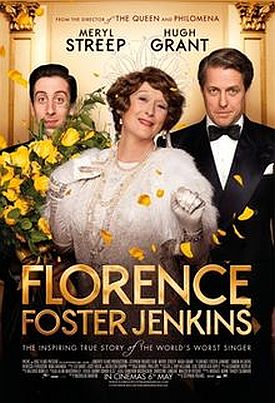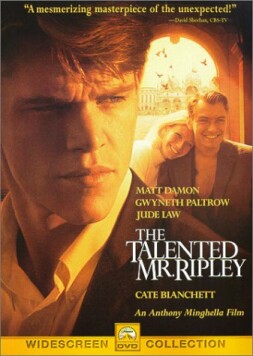Florence Foster Jenkins
One of the more subtle bits of humor in Stephen Frears’s Florence Foster Jenkins, based with reasonable fidelity on a true story, has to do with Hugh Grant’s rather modest conceit of himself as an actor — or is it that of his character, St Clair Bayfield? Here is a very successful actor playing a much less successful one who is never allowed to finish one of the recitations he is so modestly proud of contributing to the cultural evenings of which his wealthy wife, the eponymous Florence (Meryl Streep), is the acknowledged central figure. In the one that opens the movie this “eminent actor and monologist” tells the audience that he has acted in Hamlet many times (“although, sadly, not as yet in the principal role”) as he recites Hamlet’s second soliloquy (“O, what a rogue and peasant slave am I!”), stopping himself just short of the point where Shakespeare’s Hamlet says, “Why, what an ass am I!”
Just short, that is, of the point of self-awareness — the same point at which St Clair has chosen to spend his life. Hamlet the character, of course, is famous for living inside his own head to a degree not to be seen again in the world until our own time, or near to it. “O God,” he tells Rosencrantz and Guildenstern earlier in the scene that ends with that soliloquy, “I could be bounded in a nutshell, and count myself a king of infinite space — were it not that I have bad dreams.” And, more notoriously, “there is nothing either good or bad, but thinking makes it so.” Those are the words St Clair himself ends up living by as, with a very un-Hamlet like charm, tact and sensitivity, he protects his wife’s cherished illusion that she can sing.
On their return home from the event at which St Clair recites and flabby Florence is winched down from the flies to impersonate “The Angel of Inspiration” of Stephen Foster in a tableau vivant, she asks him to recite Shakespeare’s Sonnet 116 (“Let me not to the marriage of true minds admit impediments”) in bed. She falls asleep four lines into it. Later still, when he attempts to recite Keats’s “Bright Star” sonnet to her, she cuts him off after only two lines. We see how St Clair is constantly made to swallow the bitter pill of his mediocrity even as he spends his life trying to keep Florence from the knowledge of her own. You could also say that this reflects the way in which Mr Frears and his screenwriter, Nicholas Martin, keep him in the shadow of Ms Streep’s star turn, while at the same time making it obvious that he is much the more interesting character of the two.
Florence is kept at the center of attention not only by her hilariously inept singing and her apparent obliviousness to the reactions it elicits from the audiences she haphazardly recruits but also by her being the romantic victim of syphilis, supposedly contracted on her wedding night from the late Mr Jenkins, now long in his grave, when she was but 18. This also gives St Clair an excuse not to consummate his marriage (whose legal status is somewhat ambiguous) but instead to keep in a separate establishment a mistress (Rebecca Ferguson), knowledge of whom is one more thing he has to protect Florence from. The comic potential of these twin deceptions, along with the delightfully dotty Mrs Jenkins herself and the equally delightful young accompanist, Cosmé McMoon (Simon Helberg), who is drawn into their imaginary ménage, should be apparent.
But those who see this as no more than the slight if bittersweet comic offering that it appears to be are missing what amounts to a great movie of our times. Mrs Jenkins should be seen as a precursor to and the emblematic figure of an age in which, as the current presidential campaign may finally make clear to even the slowest-witted, everyone is entitled to his or her own reality. Those who have been called bigots for questioning the right of children to decide that they “really” belong to the sex opposite to their biological one may have seen this earlier than most, but it won’t be long now until this ultimate proprietorship, this infinity of spacious nutshells undisturbed by dreams, is taken for granted by everyone. It already would be, I imagine, if it weren’t for a reactionary reluctance on the part of the media to grant the same consideration to Trumpian reality.
And in this brave new world of which we are on the cusp, St Clair Bayfield is equally emblematic. Like the writers, scholars, historians, economists and scientists who are well-paid to confirm their sponsors’ and paymasters’ world-views, he is both a pathetic and a sympathetic figure. I think you’ll find that he really loves his “Bunny,” Mrs Jenkins, just as you may see a genuine nobility in his defense of her from the “mockers and scoffers” who come to laugh at her — though, admittedly, his motives in both cases remain ambiguous. Of course, it is really (if you will pardon the expression) her money which insulates her from the truth, just as it does so many of our eminent philanthropists, but the final achievement of St Clair Bayfield, failed actor, is to make us question that truth along with him, to believe in the “very happy world” he has single-handedly created out of such unpromising materials.
One more twist in the tale comes from the fact that, in his off-screen life and in semi-retirement, Mr Grant has been a leader of “Hacked Off,” a pressure group seeking legal redress from intrusive British media and therefore reclaiming from the tabloids the proprietorship of his own real life and reputation. This adds an extra dimension to his words to the young Mr McMoon, fearful for his musical reputation after Florence books Carnegie Hall for a recital from which the mockers and scoffers (along with newspaper critics) cannot be barred: “The question now is whether you stand by your friend and patron in her hour of need or focus on your ‘ambition’.” Can there be any but one answer to that question, for us any more than there is for McMoon? Can anyone now doubt that “truth” depends on who your patrons and friends are, which is to say whose side you’re on? You may also find, as it appears from their film that Stephen Frears and Nicholas Martin have found, that you have to agree with St Clair — if you’re being honest.
Discover more from James Bowman
Subscribe to get the latest posts to your email.







